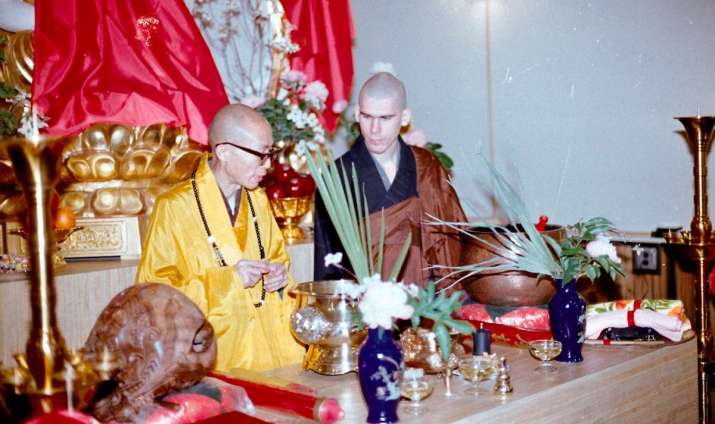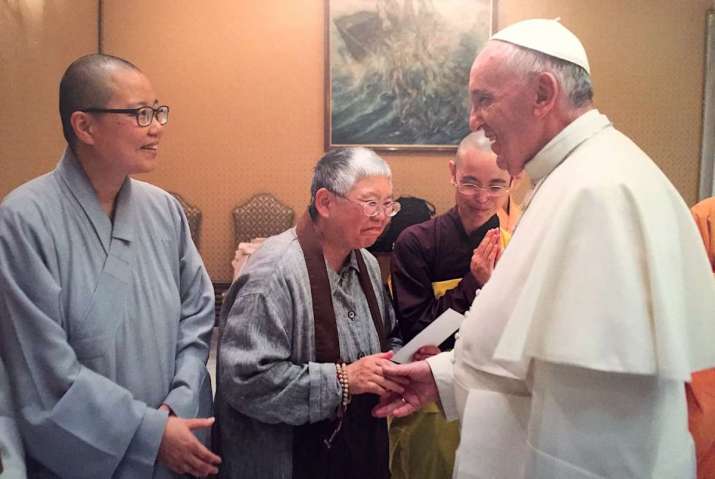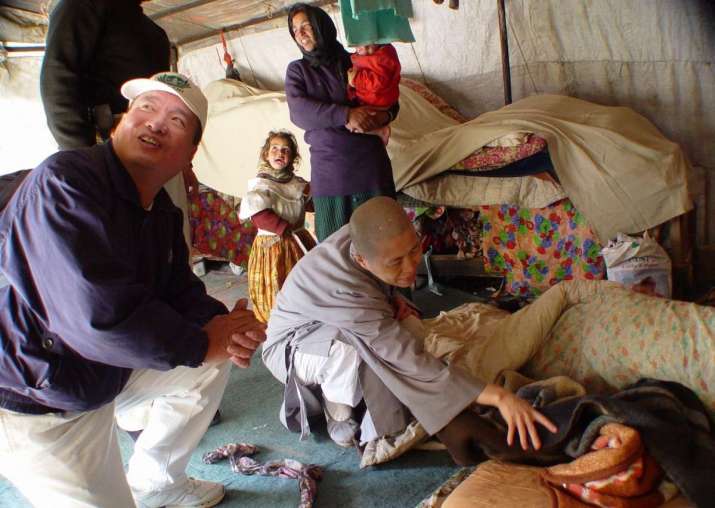FEATURES|COLUMNS|Chan in Everyday Practice (inactive)
The Daily Practice of a Modern Chinese Buddhist Nun: Keeping the Precepts and Etiquette
 Shifu and Paul Kennedy at the Chan Meditation Center. Image courtesy of Dharma Drum Publishing Corp
Shifu and Paul Kennedy at the Chan Meditation Center. Image courtesy of Dharma Drum Publishing CorpYears ago, during a fundraising gala for the Chan Meditation Center, I met Master Sheng Yen’s first Western monastic disciple, Paul Kennedy, and we invited him to share his stories about Shifu. Privately, I asked Paul how Shifu had coped during their homeless period after his arrival in the United States. It took him a while to come up with an answer, then he told me: “Actually, I don’t know. I was so worried about myself during that period, because I had just been ordained and my Shifu had no temple, and we had no place to go!” He was still searching his memory while talking to me. “But, one thing is for sure,” he continued, “He never worried! And he never allowed himself to lose his monastic etiquette. When we sat on the streets or in the park, you’d never see him fall apart. He always sat upright with his legs crossed. No matter what happened, he always maintained his monastic etiquette.”
I forget how that conversation ended, but it made me reflect deeply on what it means to be a monastic. I recalled that during my novice training we took turns to prepare breakfast for almost 200 people at a time. When it was my turn to be the chef, I planned ahead, calculating how much food to prepare and distribute for three dining halls. I tried to my best to prepare good meals for our sangha. One day, a monk asked me if I had been a cook before joining the sangha. I had mixed feelings about that question: I felt good about being professional in what I was doing as a chef, yet at the same time, I wondered why I didn’t appear more scholarly to others, having recently left academia.
In ordinary life, we shape our temperaments through family training, academic education, what we think and do, and who we interact with and how. Our identities and values change according to the work we do, what we possess, where we live, shop, eat, and so on. Gradually, we build up our own comfort zones for living and social interaction. After my conversation with Paul, I realized that my major practice was not only meditation and chanting, but also training myself behave like a monastic no matter what I’m working on or the kind of people with whom I’m interacting. This is a tough task indeed.
 Meeting Pope Francis at the Vatican in June 2015. Image courtesy of Dharma Drum Publishing Corp
Meeting Pope Francis at the Vatican in June 2015. Image courtesy of Dharma Drum Publishing CorpShifu would always remind us that, as monastics, we interact with people from all walks of life. When we meet rich or famous people, we are not inferior; when helping people in need, we are not superior. When we are nobody, it is the precepts and monastic etiquette that keep us diligent and noble within. If we are well known and receiving a lot of support, it is also the precepts and monastic etiquette that prevent us from becoming lost in the fame and money. Keeping the precepts and observing etiquette helps to protect us from corruption. I’m sure the same applies to lay people when facing life’s issues.
For me, Shifu was always the same, whether he was giving a talk at the United Nations, speaking with government officials or the president of Taiwan, working in the backyard, or even when homeless. His calm demeanor and worry-free mindset, his compassion toward others and positive attitude toward life, his faith in the Dharma and the way he maintained the precepts were not changed by those extreme changes in circumstance. In Sanskrit we call this apramada.
In his book 戒律學綱要 (Jie Lu Xue Gan Yao; Guidelines for Studying the Buddhist Precepts and Discipline), Master Sheng Yen clearly points out that keeping the precepts and maintaining etiquette both play a key role in Chan practice, and represent the foundation of all the practices—keeping us mindful and properly behaved, and preventing us from acting in body, speech, and mind based on attachments or erroneous self-centered views. Indeed, how deeply or subtly we can observe the precepts and etiquette is a good indicator of the level our mind has reached and how close we are to recognizing “no-self.” No wonder the Vinaya explains that one can achieve liberation through the perfection of keeping the precepts.
 Visiting slums in Jordan in 2004—a mother with a newborn baby. Image courtesy of Dharma Drum Publishing Corp
Visiting slums in Jordan in 2004—a mother with a newborn baby. Image courtesy of Dharma Drum Publishing CorpAs modern monastics in the Chinese tradition, we are “poor” for moral reasons. Our (Dharma Drum Mountain sangha) salary is US$100 per month in the US, but our congregants will buy us anything we ask. Yet our precepts and regulations do not allow us to possess luxuries and, more precisely, we should not own too many personal possessions. I don’t use my smartphone while walking unless using Google Maps or answering a phone call. Also among my personal disciplines: during a long drive, to try not to eat snacks (it’s very difficult!); not changing lanes too often nor speeding when no police are around; when speaking with our architect or contractors, to try not talk like a businesswoman; when encountering difficult situations, to try not to react emotionally; when giving money to homeless people, to bless them with humble and respectful eye contact, and when meeting public figures such as Pope Francis, to try not to become overexcited before he shakes my hand.
Keeping the precepts and etiquette of body, speech, and mind is to inwardly cultivate samadhi and to outwardly cultivate wisdom.
References
Master Sheng Yen. 1996. 戒律學綱要 (Jie Lu Xue Gan Yao; Guidelines for Studying the Buddhist Precepts and Discipline). Taipei: Fagu wenhua.
See more
Related features from Buddhistdoor Global
The Daily Practice of a Modern Chinese Buddhist Nun: Meeting Master Sheng-Yen and Taking the Bodhisattva Vows
Nurturing the Roots of Chinese Buddhism in Africa
Are You Sure?














